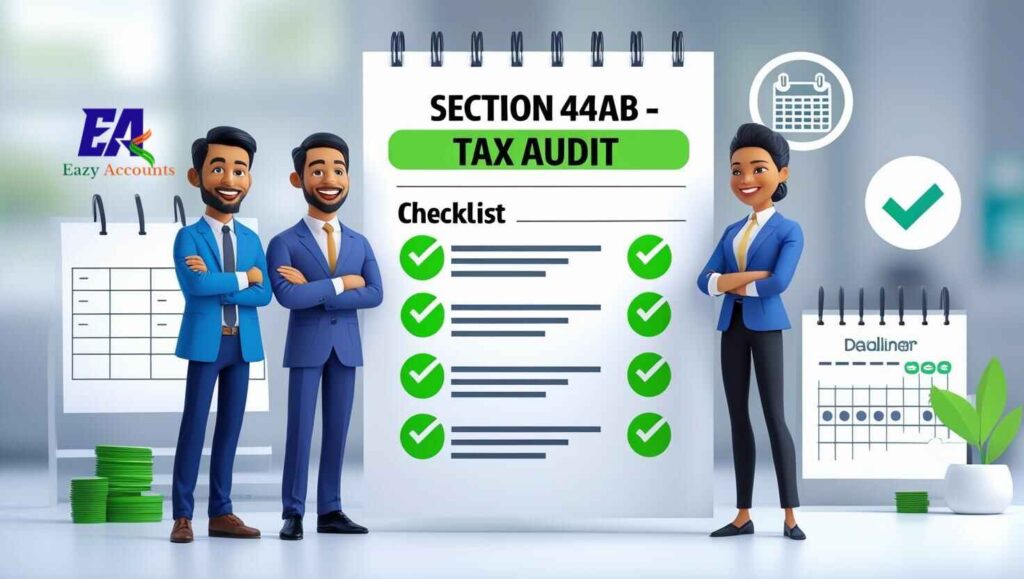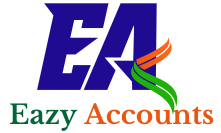Tax laws love numbers, but one number makes many taxpayers nervous – Section 44AB of the Income Tax Act. This section talks about tax audits, a check to ensure your books are accurate and reliable.
But don’t worry, a tax audit under 44AB doesn’t mean the tax department suspects you of wrongdoing. It’s simply a rule: if your turnover or receipts cross certain limits, or if you opt out of presumptive schemes, you need a qualified professional to audit your accounts.
In short, Section 44AB decides who needs a tax audit and when. Once you understand the thresholds, the rest is straightforward.

Who Needs a Tax Audit under Section 44AB of Income Tax Act?
You need a tax audit if you fall into any of these situations:
- Business
- If your turnover is more than ₹1 crore in a financial year.
- The limit increases to ₹10 crore if cash receipts and cash payments are 5% or less of total transactions.
- Profession
- If your gross receipts exceed ₹50 lakh in a financial year.
- Unlike business, there is no cash-condition relaxation here. Cross ₹50 lakh, audit is compulsory.
- Presumptive Taxation Cases
- Presumptive schemes (like Sections 44AD, 44ADA, 44AE, 44BB, 44BBB) allow you to declare profit at a fixed percentage and avoid detailed books.
- But if you declare income lower than the presumptive percentage and your total income is above the basic exemption limit, then:
- Tax audit becomes compulsory.
- You must also maintain proper books so the auditor can verify your claim.
In short: Big turnover, high professional receipts, or declaring lower income than presumptive rules allow = tax audit needed.
Business vs. Profession under the Income Tax Act
Before looking at audit deadlines and forms, it’s important to know whether your work counts as business or profession – because the limits under Section 44AB are different.
- Business [Section 2(13)]
“Includes any trade, commerce or manufacture or any adventure or concern in the nature of trade, commerce or manufacture.”
In simple words: buying and selling goods, trading, manufacturing, e-commerce, retail shops, and most commercial activities. - Profession [Section 2(36)]
“Includes vocation.”
In practice: work that requires specialized knowledge or skill – like doctors, lawyers, accountants, engineers, architects, designers, consultants, or even teachers and artists offering services independently.
Quick thumb rule:
If you sell products, you’re doing business. If you sell expertise or skill, you’re in a profession.
Specified Date & Audit Forms
If you are covered under Section 44AB, you need to:
- Get your accounts audited by a Chartered Accountant before the specified date.
- The “specified date” means one month before the due date of filing your return under Section 139(1).
- For most taxpayers, this works out to 30th September of the assessment year (assuming the current return filing due date is 31st October).
- Submit the audit report electronically along with your income tax return.
- Forms used:
- Form 3CA → If accounts are already audited under another law (like Companies Act).
- Form 3CB → If accounts are audited only for Income Tax purposes.
- Form 3CD → A detailed annexure that gives particulars like turnover, deductions, TDS compliance, depreciation, loans, etc. This accompanies both 3CA and 3CB.
In short: Tax audit isn’t just a signature. It’s a detailed report in prescribed forms, to be filed online before the deadline.
Exemptions from Tax Audit under Section 44AB
Not everyone with income or turnover needs a tax audit. Section 44AB of Income Tax Act has some clear carve-outs:
- Presumptive Income Declared Properly
- If you declare profits as per Section 44AD (business) or Section 44ADA (profession), you are not required to get an audit – as long as you stick to the prescribed presumptive percentage.
- Special Income Sections
- If your income is covered under Section 44B (shipping business of non-residents) or Section 44BBA (aircraft operation by non-residents), tax audit under 44AB does not apply.
- Audit Already Done under Another Law
- If you are required to get your accounts audited under any other law (for example, the Companies Act), then a separate tax audit is not required.
- Instead, you can submit that audit report along with Form 3CD for income tax purposes.
Basically, If you are already compliant under presumptive rules or another audit law, 44AB won’t bother you again.
Practical Examples
- Business Case – Turnover Limit
- A trader has a turnover of ₹1.4 crore with 20% in cash.
- Since turnover is above ₹1 crore and cash exceeds 5%, tax audit is mandatory.
- Business Case – Digital/Banking Transactions
- An online seller has a turnover of ₹7 crore, with cash receipts less than 1% of total.
- Since cash transactions are under 5% and turnover is below ₹10 crore, no tax audit required.
- Profession Case
- A doctor earns ₹55 lakh in gross receipts during the year.
- Since it exceeds ₹50 lakh, tax audit required.
- Presumptive Case
- A small shopkeeper with turnover of ₹80 lakh opts for Section 44AD.
- Required presumptive profit = 6% = ₹4.8 lakh.
- If he declares ₹5 lakh → No audit needed.
- If he declares only ₹3 lakh, and total income is above exemption limit → Audit becomes compulsory.
At the end of the day, Section 44AB isn’t a monster in the Income Tax Act – it’s just a checkpoint. If your business turnover crosses the limit, your profession earns beyond ₹50 lakh, or you show lower profits than presumptive rules, the law simply says: “Get a tax audit done.” Think of it as a financial health check, not a punishment.
The smart move? Track your numbers early, talk to your CA on time, and stay compliant. Because if you skip it, Section 271B allows a penalty of up to ₹ 1.5 lakh or 0.5% of turnover, whichever is lower – and that’s money better saved than paid.
Need Help?
Figuring out whether Section 44AB applies to you can be tricky, especially with presumptive schemes and turnover thresholds. If you’re unsure, it’s always safer to get professional advice before deadlines sneak up. Contact us today for clear guidance and hassle-free compliance.
